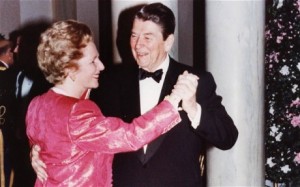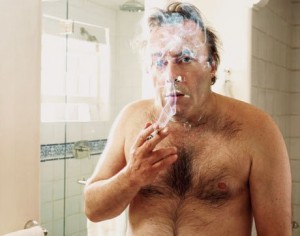REDEMPTION THREE: BETTER THAN EVER OR BETTER OFF DEAD?
In this mini-series the saga of redemption, as frequently manifested in the form of “comebacks,” is investigated. REDEMPTION ONE is here. and REDEMPTION TWO is here. Read REDEMPTION ONE before REDEMPTION THREE, inserting REDEMPTION TWO between them.

John Galliano, redeemable or not, is alive.
II. EMPIRICAL EVIDENCE
b. Better Off Dead? Two cases of Dubious Post-Mortem Redemption
As the example of time illustrates in the case of Adler, exogenous elements factor in whilst public figures are on a path towards redemption. Interestingly, the most practical way to pursue redemption might be dying. The death of a public person continues–to this day of non-secular dimensions–to make the majority of media consumers feel a predominant desire to respect their deceased status. This theory effectively extends to the redemption of some of the most controversial individuals.
MARGARET THATCHER
Margaret Thatcher’s death sparked a discourse on the very topic of the appropriateness of global media industries using unnecessary euphemisms following the passing of public figures. The mentality of “one must not speak ill of the dead” looms as a dangerous approach when it pertains to political leaders. By picking and choosing the legacy of politically-engaged people, those who pick and choose create a false record of the events that carved the lives of others.
Thatcher’s individual saga as a leadership paradigm certainly includes grand successes. She was elected thrice as the Prime Minister of the UK and was both the first female PM of the UK and first female leader of a Western country in recent history. Additionally, she actively introduced her set of conservative, nationalist political beliefs, widely known as Thatcherism.
Heated debate surrounded Thatcherism, as well as Thatcher herself. For media outlets to neglect the heavy criticism she received–and often persuasively argued against–because of her death appears callous, but also oxymoronic at its core subject, because it contradicts the nature of the person Thatcher was: a self-proclaimed “conviction politician.” Her priority was staying true to her values, despite the anticipated reaction her values would yield. It seems highly unlikely Thatcher herself would hesitate to speak ill of the dead.
This line of thinking presumes that the recently deceased Thatcher treated others in a way similar to the one she desired to be treated. Her critics emphasized that Thatcherism had a deleterious impact on the lower classes of society, the wellbeing of which she disregarded with what they considered a myopic short-mindedness. Morrissey, who first gained fame as the lead singer of The Smiths, released a statement following her death to state his strong views on Thatcher and her leadership’s footprint on the country. He provided a series of facts and events that shifted the focus to the negative aspects of the eleven years during which Thatcher was elected as the British Prime Minister. Morrisey states that Thatcher was–among many other actions–responsible for destroying industries such as mining and manufacturing, for allowing the class tensions to grow stronger by neglecting the poor, and for deciding to torpedo the Argentinian ship Belgrano in 1982 during the Falklands War sans reason. The singer then expresses his disdain for how Thatcher’s rule has stigmatized female leadership in the UK forever, by making it impossible for another woman to rise to her rank. “Thatcher was a terror without an atom of humanity,” he concludes.
In the aptly entitled “On Thatcher” for the London Review of Books, Karl Miller’s epilogue–despite the essayist’s positive outlook contradicting Morrissey’s views–corroborates the not human aspect of Thatcher’s biology: “In full flight, she was a wonderful aerodynamic specimen; and she had gained a lot from being disliked by the old gentlemen who wanted her out. Her candour was greater than theirs, and was a good thing on occasion, for all its turns and denials.” The article is indicative of a tribute of sorts, crafted to remember the strengths of Thatcher’s leading style through the presentation of quotes by people who shaped modern history. Rather than categorically frown upon the “Iron Lady’s” denouncement of Nelson Mandela as a terrorist, Miller legitimizes her decision from a political standpoint. What she gained from it, according to Miller, was vital: building a strong alliance with Gorbachev. Whether or not the motivations and unclear incentives driving the actions of a public person will make it possible for him/ her to be redeemable by the average bystander is a question of each bystander’s interpretation of ethics. In this case, Miller clearly views Thatcher’s move as keen in discernment.
Thatcher was ‘redeemed’ by death and this redemption gave her–or rather, her legacy–greater leadership power and quality. The mythopoeia that enables the selective dramatization of the celebrated events of a public person’s life, as well as the intentional silencing or omission of the weaker or criticized actions that individual engaged in, must cease. The peril of exclusively presenting the positive aspects of political lives in such cases is that they lead to a counterfeit evaluation of the actions that filled such lives: emphasizing the good and silencing the bad. It is a process that resembles in its unethical nature the intentional misrepresentation of facts to create different versions of history. Even though a universally accepted “objective” history may never exist, its manipulation to cater to the deaths of public individuals is harmful on a broad scale and certainly demagogues the pursuit of an objective history.
CHRISTOPHER HITCHENS
Another controversial public figure that became the recipient of a misrepresentative apotheosis through the media was Christopher Hitchens. Following the overly positive media coverage after the death of the controversial writer, Glenn Greenwald wrote an irrefutable article to highlight the importance of the unbiased coverage of the legacy of deceased public people who have been political. Greenwald convincingly argues that the way in which they are remembered “has substantial impact on the culture which discusses their lives.” In Hitchens’ case, the ubiquity of the public grief was unprecedented. His idolization post-mortem and the selective representation of his legacy through the media contradicted the notoriety he had received for his vitriolic ad-hominem attacks of widely celebrated individuals, such as Mother Teresa, Bill Clinton and Lady Diana.
It is the zealous conviction and fervor with which Hitchens expressed his views that makes it necessary to include even his most contested views in formulating his post-mortem legacy as a public person. The acclaimed Julian Barnes described him as “the most brilliant talker and the best argufier” he had ever met, yet also added that he “never entirely trusted him.” His tragicomical social mannerisms–his dipsomania and chain-smoking were widely recognized as a personal signature–in combination with his absolute intellectual vigor made him the eccentric persona that usually stood out in most purlieus.
“How did the character actor become a leading man? How did the fool become a sage?” questions Michael Wolff about the wide acceptance Hitchens reached as a literary preceding his death. In a condemning opinion piece which Wolff would never have published were Hitchens alive, the writer investigates what circumstances provoked the beatification of Hitchens. In a takedown piece–which hilariously feeds off of the fame and notoriety of the recently-deceased Hitchens!–Wolff attributes Hitchens’ popularity to his ceaseless social climbing. Wolff indicates that Hitchens’ strength was primarily in the vivid performance of his opinions. “In all this manic industry, there is really no memorable Hitchens book-certainly none that breaks literary ground, or forges a new argument,” Wolff–rightfully–argues.
Wolff attempts to further strengthen his point by insinuating–falsely–that Hitchens’ bountiful essays were lacking substance and were excessive in their use of bravado and didactic morality. If anything, Wolff’s accusation in this area of writing is full of the very self-aggrandizement and the devoid of an argument performed bravado of which he accuses Hitchens. Wolff’s duplicity as a relentless attacker becomes apparent when he implies, in an elitist manner, that Hitchens’ work lacked in scholarly discipline what it offered in theatricality. While the validity of Hitchens’ opinions and views was certainly ambiguous, whether or not he genuinely believed in them was not.
The writer’s identity as a provocateur who enjoyed challenging the status quo called for the media industries to ensure his polarizing opinions continued to comprise a part of him after he passed away. Theoretically, the legacy Hitchens was leaving behind was intrinsically intertwined with his contrarian opinions. In reality, his long-term friendships with media-professionals–maybe even inadvertently–led to a prismatic commemoration of his legacy. The euphemistic media-projected Hitchens memory often inadequately addressed the radical nature of his argumentation, and evaded the neoconservative tone he had adopted following 9/11. His stance in vehement support of invading Iraq was a flummoxing one that he almost stubbornly continued defending even when the propagandistic nature of a “war on terror” was gradually becoming apparent to everyone surrounding him. Hitchens, as he was nearing his death, was a vocal proponent of war, someone whose actions mirrored that he passionately believed Cheney’s rhetoric. Hence, Hitchens’ legacy should not stray away from the significance of the writer’s opinions, even when plenty of them were unpopular and might alienate the general public.
Tags: Christopher Hitchens, comeback, leadership, Margaret Thatcher, public figures, redemption, some scandalous shit




tinyurl.com/nc6x6hg
tinyurl.com/l3cselt